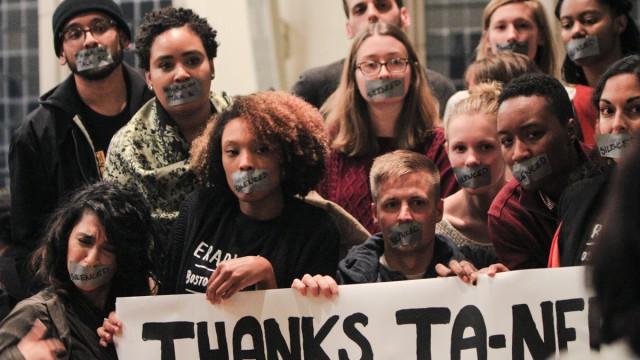To the Editor:
As faculty and staff members who teach about social justice across various disciplinary areas, we affirm our support of Boston College undergraduate and graduate students who have documented and challenged institutional racism. We write from the premise that racism exists in many forms and has very real consequences. We also take this opportunity to address claims made in “Administrators Criticize Tactics of ‘Eradicate Boston College Racism’” (The Heights, 11/5/15) that dismiss the racial grievances brought forth by our students, faculty, and staff. As long as this type of dismissal occurs, we will rightfully continue to have student groups like Eradicate Boston College Racism as well as activist uprisings like the ones at Mizzou, Yale, and Ithaca College.
It is unfortunate that such a statement needs to be made, but the practices and comments from senior level administration communicate worrisome colorblind definitions of racism and block important student perspectives on oppression on campus. As many of BC’s own faculty have studied, today’s governing approach to address racial disparities and marginalization at Boston College and the U.S. is “color-blind racism.” This phrase is defined by the idea that racism is largely a stain on the past, and that current racial disparities can be attributed to non-racial issues. In comparison to explicit racism, this “new” racism goes unchallenged because it is hidden from plain sight, making meaningful discussion that leads to actionable political and policy changes near impossible. In fact, the very mention of the possibility of racism existing in rhetorically liberal institutions such as Boston College is seen as implausible by many of those in power, thus leaving the mechanisms that perpetuate racial inequality intact.
Although there are many ways in which institutional racism manifests, it festers when there is a lack of access to information and policy and accompanying blocks to student-produced work. Since April of 2015, ERBC (Eradicate Racism at Boston College) activists have regularly asked for, and have consistently been denied, existing data on campus climate. They did not request a comprehensive data collection strategy, which would also have been appropriate, but merely access to information about their campus. When they sought approval to post the second of their infographics, which includes a positive thesis for addressing institutional racism, the request was backlogged in several administrative offices, including the Provost’s office. Students were told, as witnessed by several of the undersigned faculty, that because no policy exists for how to approve a student product that doesn’t manifest from either a course or a recognized campus group, the poster could not be approved. This bureaucratic holding pattern may seem trivial but it performs the material function of further enabling questioned practices and stalling possible interventions.
In the above-mentioned article in The Heights, senior administrators Tom Mogan and David Quigley verily scolded the members of ERBC for “disrupting” events on campus and asserted an expectation that dialogue be “respectful, civil, consistent with steadfast academic principles.” Challenges to institutionalized racism should not have to adhere to the language determined by power. To demand those terms first performs the function of delaying anti-racism debates on this campus.
In fact, the activists of ERBC have outlined the steps they take in considering direct action, including having little other option when faced with the bureaucratic blocks described above. Given the stoppage of permits while more permit processes are created and the ongoing issues of systemic racism, why wouldn’t “disruption” be a just course of action? The leadership’s demand for civility blurs the fundamentally uncivil conditions that are visited upon people of color on a campus exhibiting systemic racism and dampens speech about fundamentally harmful practices. Calls for civility distract from actions that will change the conditions on the campus that perpetuate systemic racism.
In the Nov. 5, 2015 article, Provost David Quigley asserted that “University resources should not be used to promote the message of ‘Eradicate Boston College Racism’ [because the group’s message] diminished the work of BC faculty who have focused their academic careers on fighting racism.” As scholars whose work evaluates racialized oppression and injustice, and whose mission is to help students engage oppression in its many forms, we find this statement disingenuous. It suggests that the fact of our presence at Boston College and the fact of our work are somehow equal to institutional change. Provost Quigley’s statement fails to acknowledge that the University’s core emphases remain largely European and white despite the work of faculty and staff who have “focused their academic careers on fighting racism.” To put it plainly, the provost’s assertion reflects the University’s investment in a status quo that has served it well for decades and its unwillingness to do the kind of work necessary for real, structural change.
We charge Boston College to listen to and address the experiences of its marginalized students, and to its faculty, many of whom who have expertise in understanding color-blind and institutional racism. We must be thoughtful, truthful and brave enough to talk about racism in our own backyard.
Cynthia Young
Editor’s Note: Cedrick Simmons, a representative of Eradicate Boston College Racism, has noted that the group does not refer to itself as Eradicate Racism at Boston College.
Featured Image by Julia Hopkins / Heights Staff








